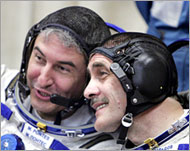Brazilian blasts off in Russian rocket
Brazil’s first astronaut has blasted off for the International Space Station on a Russian rocket.

Marcos Pontes, a 43-year-old Brazilian Air Force pilot, was hunched inside the spacecraft with Russian cosmonaut Pavel Vinogradov and US astronaut Jeffrey Williams, both of whom were starting a six-month rotation in space.
The Russian Soyuz rocket took off at 6.30am (0230 GMT) from the Baikonur cosmodrome, on a piece of Kazakh steppe rented by Russia from its former Soviet neighbour. It is scheduled to dock in two days’ time.
“Everything is good. Marcos is in space,” a Russian official told the Brazilian’s wife, Fatima, who was watching the launch on Thursday.
Onboard cameras showed Pontes, who had a window seat, wearing a wide smile, giving a thumbs-up and pointing to the Brazilian flag on the left arm of his spacesuit.
Family support
At Baikonur, a crowd of about 150 relatives of the crew, space officials and journalists craned their necks to follow the trajectory of the rocket after its ground-shaking liftoff into the bright morning sky.
 |
|
Brazil’s Marcos Pontes (L) with |
Said Fatima: “It was very emotional. I can’t even explain how I feel – very, very happy.”
Their 15-year-old daughter, Ana, added: “I was crying during the launch because his dream came true.”
Pontes, who packed a Brazilian flag and football team shirt, returns to earth in 10 days with the outgoing crew, American Bill McArthur and Russian Valery Tokarev.
Pontes had said on Wednesday that he was taking the flag and jersey in the hope it would bring his nation’s team victory in the forthcoming World Cup.
Officials monitoring the launch at Russian Mission Control outside Moscow held their applause until the spacecraft reached near-Earth orbit, about 10 minutes after launch.
Vladimir Solovyov, the Russian mission control chief, said that the only glitch was a minor technical communications problem.
“Everything went according to plan and normally,” he said.
The Soyuz TMA 8 spacecraft is due to dock at the station early on Saturday. Vinogradov, who is the commander of the crew, said they would carry out over 65 scientific experiments during the mission, including some to test human reaction to prolonged space travel.
Depending on Russia
Vinogradov and Williams are due to be joined by European Space Agency astronaut Thomas Reiter, of Germany, when the space shuttle Discovery visits the station in July.
Once Reiter arrives, the station’s long-duration crew will be three in number for the first time since May 2003, following the Columbia disaster that killed seven astronauts that February.
Pontes began training in 1998 in the United States and had been scheduled to fly to the space station on board a US space shuttle.
But those plans were scrapped after the Columbia explosion and Brazil opened talks with Russia about having Pontes travel on a Russian rocket.
The American space programme has depended on the Russians for cargo and astronaut delivery to the space station since the Columbia explosion.
The shuttle Discovery visited the station in July but had problems with the foam insulation on its external fuel tank.
Soyuz rockets have proved safer than the shuttle despite their 1960s heritage.